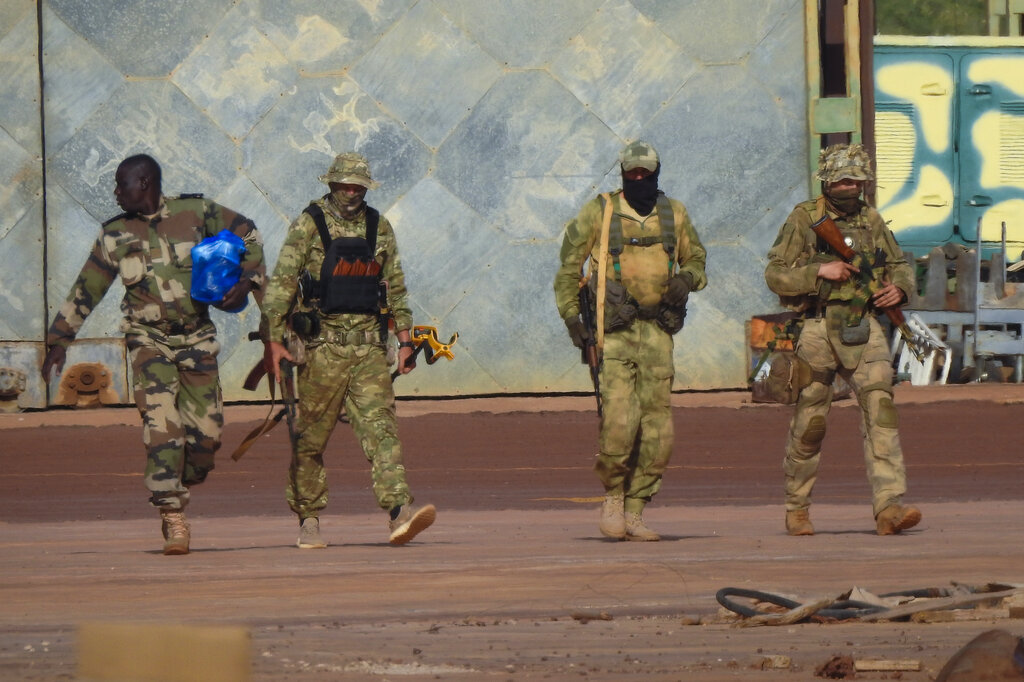ADF STAFF
The list of central Malian towns where massacres have occurred is growing as Russia’s notorious Wagner Group expands its reach in the country.
In March it was the towns of Diabaly, Nioni and Moura. In April, Hombori, Boni and Mondoro were added to the list.
Witnesses and survivors of joint Malian-Russian operations tell similar stories involving indiscriminate killings, summary executions, torture, theft and rape. Kidnappings often follow and villagers have been forced at gunpoint to dig mass graves.
Sahel researcher Yvan Guichaoua, a senior lecturer on international conflict at the University of Kent in England, says abuses are on the rise.
“That uptick coincides with the arrival of Russian forces,” he told The New York Times. “The frequency and the scale of these attacks are unprecedented.”
The Armed Conflict Location & Event Data project, which tracks violence around the world, reported as many as 456 civilians killed in nine incidents involving Malian forces and Wagner between January and mid-April 2022.
On May 30, the United Nations’ mission in Mali, known as MINUSMA, reported on human rights abuses committed by the Malian military “supported on certain occasions by foreign military elements.”
MINUSMA said state-sanctioned violence against civilians had increased tenfold between the end of 2021 and the first quarter of 2022, corresponding to the time frame of the Wagner Group’s arrival.
Videos on social media in March showed dozens of burned corpses found near Diabaly. Locals said those were the bodies of shepherds who were tortured and executed in a nearby Malian military camp where Russians were operating.
Weeks later, the staggering number of victims in the Moura massacre, estimated by witnesses to be as many as 600, drew international outrage and condemnation.
Malian officials announced an investigation into the allegations of human rights violations in Moura but continue to block U.N. access to the site.
Survivors of a Wagner attack on the village of Hombori in April said Russian mercenaries shot indiscriminately into the community livestock market on April 19, killing as many as 20 people and taking 60 others away on trucks. Locals believe many were later tortured and executed.
“There were no jihadists. No men were armed. People fled in all directions. They killed several dozen people,” a local merchant using the pseudonym Ahmed told the British newspaper The Telegraph. “My older brother was caught in front of his store. It was white people, Russians, who arrested my brother.”
Experts estimate that Russia has about 1,000 mercenaries in Mali. They are deployed to at least 15 military bases and installations, including bases handed off from French forces to Malian troops, according to a May 31 New York Times report.
The Wagner Group has conducted military operations in the Central African Republic, Libya, Madagascar, Mozambique and Sudan. Accusations of massacring civilians, committing human rights violations and other atrocities have followed in nearly every case.
Deploying mercenaries in unstable nations is a well-known method Russia uses to carry out its foreign policy objectives and gain access to natural resources, while denying any connection to the private military companies.
Daniel Eizenga, research fellow at the Africa Center for Strategic Studies, says the Wagner Group is obscure and nebulous by design.
“It’s a conglomerate of different shadowy logistics and mercenary groups all under this infamous heading of Wagner Group,” he said in an April 28 interview with the Turkish Radio and Television Corporation.
“It’s not likely we’re ever going to have any kind of official confirmation of their activity, even though it’s becoming more and more documented that there are Russian mercenaries in Mali that are engaged in conflict, fighting alongside Malian Soldiers.”

